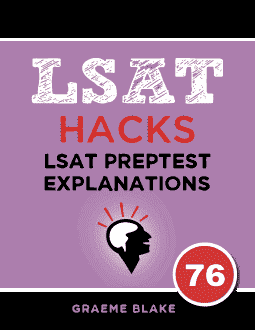QUESTION TEXT: A manager cannot extract the best performance from…
QUESTION TYPE: Principle – Conform
FACTS:
- Employees will only improve their performance if they want to do it for its own sake.
- Managers can motivate employees by delegating decisions.
- Threats or financial rewards won’t work.
ANALYSIS: This is a principle question where you need to find an answer consistent with the facts. There’s no way to prephrase this. Instead, you should reread the facts, clarify them, and simplify them so that you’ll recognize when a principle matches.
In particular, the principle should talk about how responsibility leads to motivation which leads to good performance.
___________
- This says nothing about motivation.
- We don’t know if delegation leads to prestige. This answer is a trap.
- CORRECT. This matches exactly. “Some cases” = the cases of the managers. Relinquishing control = “delegating”.
So: “In the case of the managers, their own effectiveness is enhanced by delegating.”
The managers’s job is to lead their employees, so motivating employees to perform better counts as enhancing the manager’s role. - This doesn’t follow. The author didn’t say that managers should delegate all decisions.
- This contradicts the stimulus. If self interest worked, then threats or offers of financial rewards should have been very motivating.


In this question, are they not referring to the productivity of employees in the passage? Why does the answer refer to the increased productivity of managers? Perhaps I am misunderstanding the passage or the answer, but I was just unsure about the switch of subject.
The stimulus does refer to employee productivity, but its primary subject is how managers can extract the best possible performance from their employees, i.e. how managers can perform most effectively in their role, and achieve the goal of higher outputs from their workforce.
(C) precisely describes the scenario in the stimulus. Managers can improve their own effectiveness by slightly relinquishing control.
It is just annoying because there is a massive assumption: that a “manager’s effectiveness” is = to being able to extract best performance from employees. Really abnormal for the LSAC to use such an ambiguous new term in the correct answer choice.
I hear you. When something seems confusing though it’s worth looking into exactly how the question is constructed. LSAC is incredibly precise and tends to support everything, though indirectly.
C isn’t claiming that managers are effective ONLY by extracting the best performance from employees. But it’s certainly one of the roles a manager has. We know this from common sense, and also from the first sentence. The argument is entirely about how managers can extract the best performance from employees.
The only way to give this argument a sensible meaning is to figure this is one of the roles of managers. Imagine if the LSAC had a passage about “One of the best ways for managers to light their buildings on fire and….”. It wouldn’t make any sense for someone to advise managers how to do that, as arson is not something mangers try to do.
The LSAT expects you to use common sense in interpreting situations. If everyone would agree with something then you can use it as a fact. And everyone would agree that a major role of managers is managing employee performance.
Note: This is an old comment but I wanted to clarify the point.